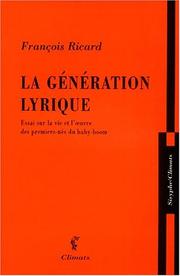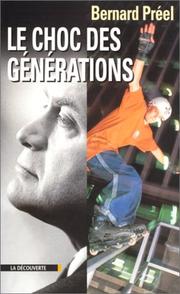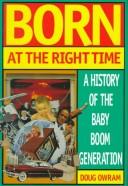| Listing 1 - 6 of 6 |
Sort by
|

ISBN: 2841581934 9782841581931 Year: 2001 Publisher: Castelnau-le-Lez: Climats,
Abstract | Keywords | Export | Availability | Bookmark
 Loading...
Loading...Choose an application
- Reference Manager
- EndNote
- RefWorks (Direct export to RefWorks)
Generation du baby-boom --- Valeurs (Philosophie) --- Generations
Book
ISBN: 2760643735 9782760643734 Year: 2021 Publisher: Montréal : Presses de l'Université de Montréal,
Abstract | Keywords | Export | Availability | Bookmark
 Loading...
Loading...Choose an application
- Reference Manager
- EndNote
- RefWorks (Direct export to RefWorks)
"Cet ouvrage collectif traite des parcours de vie de Québécois issus de la génération du baby-boom en les mettant en lien avec les étapes des cycles de vie des individus ainsi qu'avec les événements sociaux et politiques qu'a connus la province au cours des dernières décennies. Partant des récits de vie et d'itinéraires de sens collectés auprès de près d'une centaine de répondants, les auteurs explorent les processus de mise en sens des expériences individuelles et collectives. Il en ressort que, en dépit de l'invisibilité du religieux sur la place publique comme dans les déclarations des répondants, la plupart des personnes rencontrées affichent des croyances et pratiques qui leur sont propres. Si ces dernières empruntent à divers registres religieux souvent inspirés de la diversité culturelle présente au Québec, la mémoire et l'éducation catholiques demeurent présents dans les récits comme dans les pratiques, comme une référence contre laquelle on se définit ou dont on reconnait l'héritage, souvent teinté d'affect. Ces récits personnels mettent en scène la modernité québécoise, la sécularisation de la société ainsi que les débats identitaires qui animent l'imaginaire collectif et contribuent à façonner les consciences individuelles."--
Catholics --- Baby boom generation --- Catholiques --- Génération du baby-boom --- Religious identity --- Identité religieuse --- Catholic Church --- Québec (Province) --- Civilization. --- Civilisation
Book
ISBN: 0773756841 Year: 1994 Publisher: Toronto, Ont. Stoddart
Abstract | Keywords | Export | Availability | Bookmark
 Loading...
Loading...Choose an application
- Reference Manager
- EndNote
- RefWorks (Direct export to RefWorks)
History of civilization --- anno 1960-1969 --- Quebec --- Baby boom generation --- Civilization, Modern --- Values --- Génération du baby-boom --- Civilisation --- Valeurs (Philosophie) --- Génération du baby-boom --- Quebec [Province]

ISBN: 2707129496 Year: 2000 Publisher: Paris : La Découverte,
Abstract | Keywords | Export | Availability | Bookmark
 Loading...
Loading...Choose an application
- Reference Manager
- EndNote
- RefWorks (Direct export to RefWorks)
Intergenerational relations --- Baby boom generation --- Relations entre générations --- Génération du baby-boom --- Age groups. --- Intergenerational relations. --- Social values. --- Relations entre générations --- Génération du baby-boom --- Baby boom generation. --- Age groups --- Social values
Book
ISBN: 2717849939 9782717849936 Year: 2005 Publisher: Paris : Economica - anthropos,
Abstract | Keywords | Export | Availability | Bookmark
 Loading...
Loading...Choose an application
- Reference Manager
- EndNote
- RefWorks (Direct export to RefWorks)
Age distribution (Demography) --- Baby boom generation --- Aging --- Older people --- Retirement income --- Population forecasting --- Fiscal policy --- Economic forecasting --- Répartition par âge (Démographie) --- Génération du baby-boom --- Vieillissement --- Personnes âgées --- Revenu de retraite --- Prévision démographique --- Politique fiscale --- Prévision économique --- Economic aspects --- Government policy --- Aspect économique --- Politique gouvernementale --- United States --- Etats-Unis --- Population --- Répartition par âge (Démographie) --- Génération du baby-boom --- Personnes âgées --- Prévision démographique --- Prévision économique --- Aspect économique --- Vieillissement de la population --- Économie politique --- Prévision --- PREVISIONS DEMOGRAPHIQUES --- PREVISION ECONOMIQUE --- RETRAITES --- GENERATION DU BABY-BOOM --- DEMOGRAPHIE --- PERSONNES AGEES --- POLITIQUE FISCALE --- ETATS-UNIS --- REVENUS --- ETAT-UNIS --- POPULATION --- CROISSANCE. --- VIEILLISSEMENT --- ASPECT ECONOMIQUE --- POLITIQUE PUBLIQUE

ISBN: 0802059570 1442657103 1281996343 9786611996345 1442681616 080208656X 0802080863 9781442681613 0802037518 9780802086563 1442659017 Year: 2003 Publisher: Toronto
Abstract | Keywords | Export | Availability | Bookmark
 Loading...
Loading...Choose an application
- Reference Manager
- EndNote
- RefWorks (Direct export to RefWorks)
The Canadian Constitution of 1867 as written should have provided the authoritative guide to the law governing the division of powers between the national and provincial governments of Canada, but by the 1940s the federal constitution was a very different document to that composed originally by John A. Macdonald and his colleagues. In this engaging and exhaustive examination of the critical role of the courts? the Judicial Committee of the Privy Council and the Supreme Court of Canada? in shaping Canadian federalism, John Saywell argues that the courts always have and still do 'make law'? law that can be largely subjective and often bears little relationship to the text or purposes of the Constitution. Saywell begins his analysis by offering new evidence and insights on the structure of the 1867 constitution. Relying heavily on the voices of the actors themselves, his analysis moves beyond a simple examination of previously published reports and examines oral arguments before the Judicial Committee, largely from manuscripts, to determine how the Committee interacted with counsel, developed their arguments, and came to their conclusions. Critical of the jurisprudence of the Judicial Committee, which he argues virtually eliminated some of the critical legislative powers of the federal government and destroyed its capacity to act on the economic and social problems of the twentieth century, Saywell credits the Supreme Court with restoring the balance in the federation and strengthening the national government. Comprehensive, ambitious, and detailed, The Lawmakers will be the definitive work on the evolution of the law of Canadian federalism.
Baby boom generation --- Youth --- Génération du baby-boom --- Jeunesse --- Canada --- Population --- Civilization --- Social conditions --- History --- Civilisation --- Histoire --- Canada. --- History. --- Economic conditions --- Politics and government --- Génération du baby-boom --- Baby boomers --- Boomers, Baby --- Generation, Baby boom --- Post-war generation --- Postwar generation --- Generations --- Supreme Court of Canada --- Judicial power --- Constitutional history --- Judiciary --- Justiciability --- Power, Judicial --- Constitutional law --- Courts --- Implied powers (Constitutional law) --- Judicial independence --- Separation of powers --- Canada. Supreme Court --- Canada (Province) --- Canadae --- Ceanada --- Chanada --- Chanadey --- Dominio del Canadá --- Dominion of Canada --- Jianada --- Kʻaenada --- Kaineḍā --- Kanada --- Ḳanadah --- Kanadaja --- Kanadas --- Ḳanade --- Kanado --- Kanakā --- Province of Canada --- Republica de Canadá --- Yn Chanadey
| Listing 1 - 6 of 6 |
Sort by
|

 Search
Search Feedback
Feedback About UniCat
About UniCat  Help
Help News
News